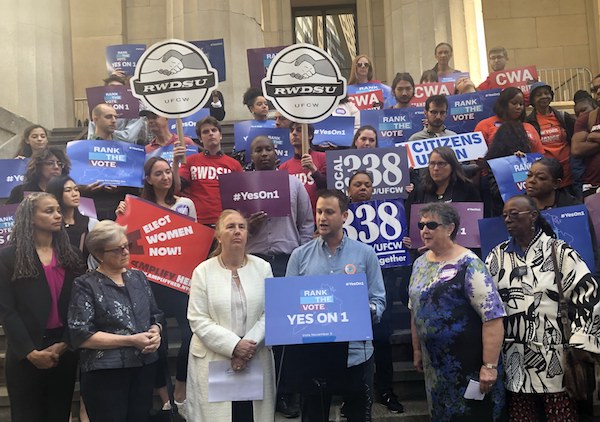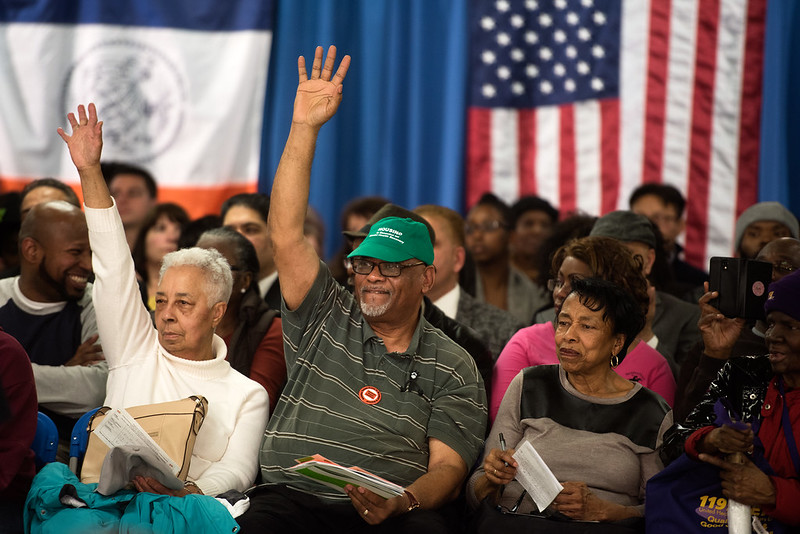Ranked-Choice Voting is the Next Step in New York Voter Empowerment

At Empire State Indivisible, lowering the barriers to engage in our representative democracy has always been the guiding light for our organizing efforts. It is why, in coalition with grassroots organizers across the state, we fought so hard to engage voters to defeat the former members of the Independent Democratic Conference and then to elect a true Democratic state Senate majority in Albany. And it is why we continue to work so closely with allies to deliver critical voting and campaign finance reforms at the state level. Simply put: we need to expand the electorate and strengthen our representation in the face of increasingly hostile and emboldened attacks on our democracy.
This fall, New York City has the opportunity to go one step further. Voters across the five boroughs have the opportunity to once again lead the state forward by embracing a ranked-choice voting system through a “yes” vote on ballot proposal 1.
Ranked-choice voting will uplift and strengthen the voices of everyday New Yorkers while encouraging a diverse set of candidates who seek to represent their full constituencies. And it’s critical we recognize the additive power of those two outcomes.
The status quo of our electoral politics in this country has left a massive void between the organizing required to win an election and the organizing required to properly represent your constituents. And this has led to an increasingly disconnected electorate and plenty of examples of ineffective governance. But we have started to see a shift.
The last two years have shown the promise of progress that is enabled by candidates who get elected based on grassroots organizing and an engaged constituency. Much attention has been focused on the election results themselves. But it was also the commitment to organizing post-election and the prioritization of constituent advocacy from those electeds that led to a string of massive results this past legislative session in Albany. In other words, an engaged constituency is the single most powerful enabler of progressive democracy.
Ranked-choice voting rewards those who recognize the power of this virtuous engagement cycle.
Ranked-choice voting also has the power to excite those who may have previously sat on the sidelines. Elections are about choice. But far too often, elections become about divisiveness. We have heard time and time again during our canvassing of the city and state that our elections have become too divisive. The negativity is driving away otherwise active community members and we can’t afford to keep up that trajectory.
By enabling New Yorkers to choose multiple candidates by ranking their preferences in a crowded field, we can envision a more productive and more positive approach to our elections; candidates will seek to appeal to more voters and run more positive campaigns about vision and progress. One in which candidates recognize the power of their shared views and embrace the power of organizing around ideas instead of power.
We believe New York City is best when it leads. And we believe ranked-choice voting leads to the right incentives for a healthy and engaged democracy. One of the victories achieved through the new state Senate majority is the early voting system that will be launched starting this October, providing voters the chance to cast their ballots more conveniently.
Ranked-choice voting, placed on the ballot by a New York City charter revision commission, can be another step in voter empowerment.Vote “yes” on ballot proposal one this fall and help approve ranked-choice voting for New York City.
***
Ricky Silver is co-lead organizer of Empire State Indivisible. On Twitter at @es_indivisible.
***
Have an op-ed idea or submission for Gotham Gazette? Email This email address is being protected from spambots. You need JavaScript enabled to view it.
Manhattan Democrats Just Elected New County Party Reps, But Their Voices May Not Be Heard Until 2021

(photo: Demetrius Freeman/Mayoral Photography Office)
This past Thursday, the Manhattan Democratic Party announced its bi-annual “Organization Meeting” for this coming Thursday, October 3. This gathering of the party’s over 2,000 County Committee members is a critical moment when those newly elected representatives of Democratic voters set the course for the Democratic Party going into 2020.
Or so everyone thought.
Disregarding the exceedingly short notice, which is sent by mail and won’t reach most County Committee members until mere days before the meeting, nobody even knows who will be allowed to vote.
The 2018 elections were a watershed moment in United States politics, shifting the House of Representatives to Democratic control, but also many state legislatures; New York was a prime example. Here, activists worked tirelessly to unseat the former members of the Independent Democratic Conference (IDC) -- a group of State Senators who worked with Republicans to hold up a backlog of nearly 40 years worth of progressive legislation --and to flip several GOP seats to Democrats.
In that backlog were staples of the progressive agenda such as codifying Roe v. Wade and securing a better rent-stabilization program for New York City. Included in the changes that swept through Albany was a bill to merge the multiple primary election dates. The goal was to increase voter turnout by putting all our primary elections on the same day (except the presidential primary, which is in April). Because federal primaries couldn’t be made later due to federal law, state primaries were moved to June.
In the minutiae of election law is a simple provision - political parties must convene their county committees, which are elected in the primary, within 30 days of said primary. With the change to a June primary, however, that would put the organizational meetings in July. Manhattan and Staten Island, whose voters elected county committee membership this year, worried that nobody would be around. In response, the state legislature quietly changed the law to set the date of the organizational meetings between September 16 and October 6. It furthermore prescribed that the previous county committee holds power “until” the meeting while the newly elected committee assumes power “after” the meeting.
While Staten Island Democratic County Committee members met and their 2019 members elected new county party leadership without controversy, Manhattan faces a different situation. Contested elections for leadership, new ideas for organizing, and a controversial proposal to ban registered lobbyists from top party positions have led to arguments as to which cohort of the Manhattan Democratic County Committee will be allowed to vote - delegates elected by voters in 2017, or those elected this year.
With the Manhattan county committee organizational meeting and its elections just days away, the debate continues.
Since 2017, the number of people who did the work of gathering signatures to run for county committee has grown by around 600. Many got involved because of Donald Trump’s election in 2016 and wanted to do more for 2020. It’s unlikely they’ll appreciate being cut out of Democratic Party decision making, but it’s not up to them. Though the bill authors in the state legislature and officials at the State Board of Elections have said the intent is for members elected in 2019 to vote in 2019, those local party representatives may have to wait until 2021 to impact how the Democratic Party does business.
***
Ben Yee is a civic educator and organizer in New York City. He currently serves as Secretary of the Manhattan Demcoratic Party and Democratic State Committeeman for New York’s 66th Assembly District. Chair. He is currently a candidate for Manhattan County Committee leadership. On Twitter at @yben.
***
Have an op-ed idea or submission for Gotham Gazette? Email This email address is being protected from spambots. You need JavaScript enabled to view it.
Reining in the Maleficent Middlemen: Governor Cuomo Should Sign America’s Toughest Prescription Drug Legislation

(photo: Kevin P. Coughlin/Office of the Governor)
Like the rest of America, New York State is ensnared in the stranglehold of our byzantine healthcare system, which today is best known for skyrocketing pharmaceutical drug prices and a rapid decline in quality of care. One of the most vicious, insidious, and disingenuous tentacles of that system choking the life out of us is the group of corporations known as Pharmacy Benefit Managers (PBMs).
While just three Fortune 25 companies – CVS, Express Scripts, and OptumRx – control nearly 80% of the pharmacy benefits market, most Americans are unaware of the outsized role PBMs play in their healthcare. And PBMs want to keep it that way.
Hired by insurance companies as their prescription drug middlemen, PBMs claim they play an important role in making prescription drugs accessible and affordable for consumers – including in New York’s Medicaid program – by negotiating prices with manufacturers.
In reality, however, PBMs control which medications are covered by insurance, what patients pay out-of-pocket and the amount pharmacies get reimbursed for dispensing them. PBMs are unregulated thieves who are not required to — and therefore don’t — disclose how much money they take in, how much they pay out, or the savings they achieve through this process.
When challenged to provide more transparency about their business practices, PBMs flat-out refuse. Why? Because a lack of oversight is their key source of power. And it’s the consumers, and the pharmacies that dispense medications, who pay the price.
According to a study by the Pharmacists Society of the State of New York (PSSNY), PBMs last year pocketed 24% of New York State Medicaid managed care spending. That adds up to more than $300 million in taxpayer money in the hands of giant corporate middlemen that do not actually provide any healthcare service.
How did they do that? Through a nasty practice called “spread pricing,” in which a PBM bills an insurer for prescription drug claims at one rate and then reimburses the pharmacies that filled those prescriptions at a substantially lower rate. The difference, which PBMs pocket, is called the “spread.”
Thanks to Governor Cuomo and the state Legislature, New York in April became among the first states in the country to eliminate spread pricing in Medicaid managed care. This was a tremendous step in the right direction. But PBMs continue to hurt patients, taxpayers, and independent pharmacies.
The good news for New Yorkers — potentially excellent, game-changing news — is that the New York Senate and Assembly recently passed legislation that at last would impose common-sense requirements on PBMs aimed at fostering greater transparency.
These new regulations, which await Governor Cuomo’s signature to become law, have been described as the toughest PBM legislation in America, offering significant, critical protections to patients, taxpayers, and neighborhood pharmacy owners — and a roadmap for the rest of America to follow.
In short, the regulations would further curtail spread pricing beyond Medicaid managed care, require PBMs to disclose previously confidential information, and give pharmacies the mechanisms they need to seek recourse for abusive PBM practices.
We know that deep-pocketed PBMs — which only care about their profits — have an array of lobbyists trying to water down, if not outright kill these regulations. We cannot afford to be bullied and manipulated by PBMs any longer. It is time to end this abusive system that preys on citizens.
Other states are taking action, too. Ohio recently dumped PBMs for billing Medicaid $244 million more than they paid pharmacies, awarded $100 million to independent pharmacies for their losses, and introduced a new state program, transparent in nature and defined as a pass-through PBM. We applaud that action, too. But New York has an opportunity to take a major step forward here.
That is why we stand behind Governor Cuomo, who time and again has proven that he fights for New Yorkers and is one of America’s most progressive leaders.
PBMs are destroying our healthcare system. We need to reign in their ability to control the medications physicians prescribe. Let me ask: Who do you think should be dictating healthcare strategies? Soulless PBMs, who are not in the healthcare business, but the money-making business, or our doctors and pharmacists, trained and licensed professionals dedicated to keeping us healthy?
PBMs are not going away. But we are on the verge of a historic moment, not just for New Yorkers, but for all Americans. And when Governor Cuomo signs these regulations into law, we will be there to celebrate.
***
Yuriy Davydov, Pharm D., is the Founder & CEO of Zero Copay Program (ZCP), a pass-through PBM. On Twitter @ZCP_Inc.
***
Have an op-ed idea or submission for Gotham Gazette? Email This email address is being protected from spambots. You need JavaScript enabled to view it.




